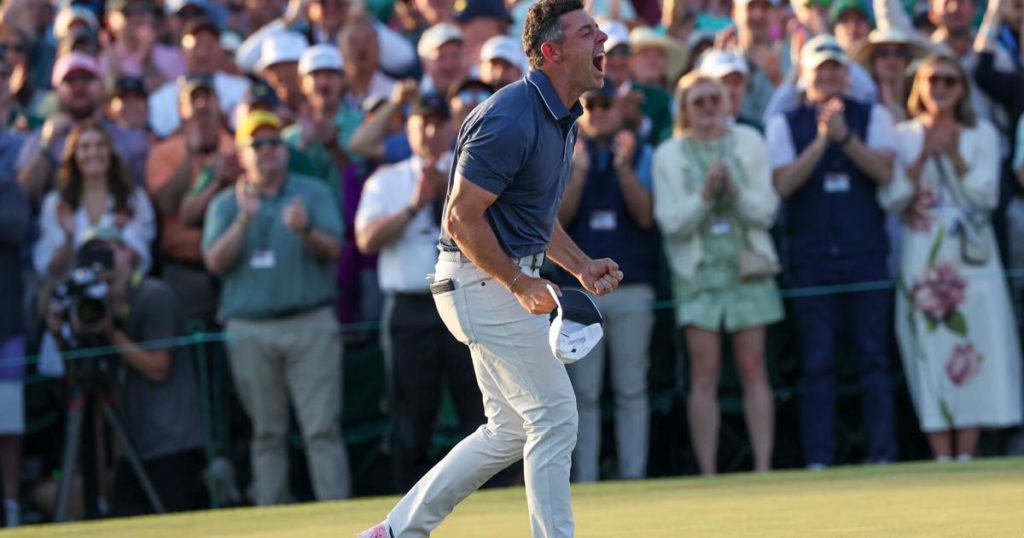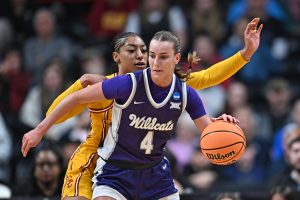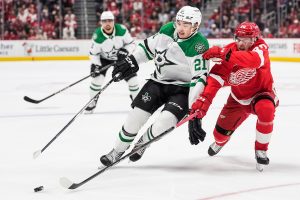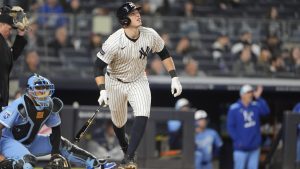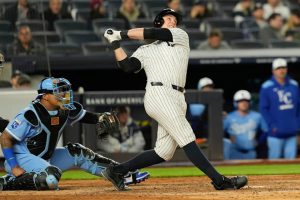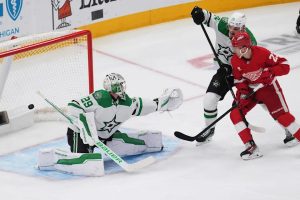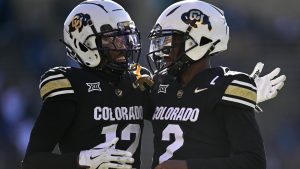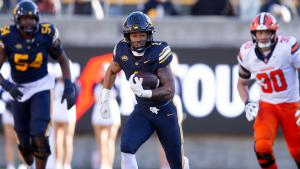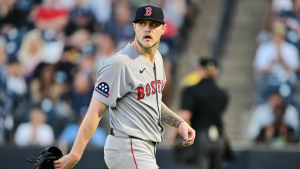Apr. 14—AUGUSTA — A scoreboard worker said everything without saying a word Sunday at Augusta National Golf Club.
Perched above the “THRU 4” sign on the side of the big board next to the fifth green, and with an earpiece in his right ear, he knew he had information that was going to send the patrons at the 89th Masters Tournament into a frenzy.
Ludvig Åberg and Jason Day were finishing up on the green, with Patrick Reed and Corey Conners teeing off behind them. Swapping out names and numbers on the scoreboard during play is a delicate process, so the workers waited until between putts to deliver the big news.
The slat containing Bryson DeChambeau’s name and scores was the first to change. DeChambeau had gone from two shots down to one shot ahead in a hurry, thanks to his par-birdie start to the final round while Rory McIlroy quickly tumbled from the top spot with a double bogey on 1 and a par on 2.
Another swing came on 3, though, with McIlroy birdieing and DeChambeau bogeying, putting McIlroy back up by one. DeChambeau’s score line reappeared on the board, now with a red 9 signifying he made a second consecutive bogey on the par-3 fourth hole.
A pause followed as the patrons began to murmur and Åberg and Day started to make their way to the sixth tee, when the worker reached out his arms from the “THRU 4” sign and started waving them up and down, letting the patrons know something big was coming.
McIlroy’s name disappeared, then emphatically reappeared with a red 12. Birdie. Three-shot lead. Pandemonium.
As it turns out, the fun was only getting started.
McIlroy built what felt like an insurmountable lead, only to stumble in a way that felt like he was going to experience his most painful major heartbreak yet, only to give himself a six-foot putt to win the Masters, only to miss it and go to sudden death against Justin Rose, only to hit his third “shot of a lifetime” in the span of five holes to finally, finally, finally become the sixth player to secure the modern career Grand Slam.
It was anything but easy, and it was never going to be for McIlroy. Nothing has been in the majors for the last decade, after he made it look so easy in piling up four of them before turning 26 years old.
He visited all of his ghosts of majors past over the course of the back nine Sunday. He blended together elements of Greg Norman’s collapse in 1996 and Jordan Spieth’s in 2016, Phil Mickelson’s breakthrough in 2004, Jack Nicklaus’ sixth and final title in 1986, even Sully Sullenberger landing a distressed plane on the Hudson River — the full range of emotions in a span of a couple of hours, but the most important part is that he brought it home.
“Look, it’s a dream come true. I have dreamt about that moment for as long as I can remember,” he said. “I mentioned it out in the prize ceremony, but watching Tiger here in 1997 do what he did, and then winning his first green jacket, I think that inspired so many of my generation to want to emulate what he did.
“You know, there were points in my career where I didn’t know if I would have this nice garment over my shoulders, but I didn’t make it easy today. I certainly didn’t make it easy. I was nervous. It was one of the toughest days I’ve ever had on the golf course.”
There was no denying McIlroy was the patrons’ choice to win the Masters — yes, DeChambeau has become decidedly more human in the last couple of years and has picked up a vocal legion of fans in the process, but no golfer on the planet has been as outwardly human than McIlroy.
He said earlier in the week that he’s tried a variety of approaches to win the Masters over the last decade-plus, from treating it like any other week to giving it a little extra, anything to finally answer that question that’s followed him to Augusta year after year after year.
That question looked like it was going to resurface after the double bogey on 1, only for it to look like maybe it was finally his time when his approach into 10, with the type of awkward follow-through that for anyone but Hideki Matsuyama suggests a shot nowhere near the flag, settled 15 feet from the cup to set up a birdie.
It looked that way again when his second shot into 11 bounded toward the water left of the green, somehow staying dry in a spot where that just doesn’t happen. He made bogey, but it didn’t feel terribly significant after DeChambeau rinsed his approach.
He made the safe play on 12, then took the safe route on 13 with a layup to give himself an easy wedge with plenty of green to work with for his third shot.
What ensued from there conjured up that infamous image of McIlroy in the cabins left of the 10th tee in 2011, as he inexplicably missed short and right and found the water for a costly double bogey.
A bogey on 14, coupled with Rose going on a heater, left McIlroy walking off that green one shot back after departing the 12th with a four-shot lead.
His second shot into the par-5 15th, a high, majestic right-to-left bender from 209 yards to 6 feet, was one of the best shots in Masters history, shades of Mickelson’s second from the pine straw on 13 on Sunday in 2010 — and, like Mickelson, the eagle putt never scared the hole but set up a tap-in birdie.
He safely navigated 16’s dangerous back-right pin position, then delivered another shot of a lifetime on 17 from 196 yards to 2 feet. A birdie gave him the lead at 12 under, only for Rose to crank up the volume one more time with his 10th birdie of the day on the 18th green to get into the clubhouse at 11 under.
A titanic blast off the tee on 18 gave McIlroy an easy wedge into the green, and he again blacked out on the approach, depositing it in a bunker and missing a five-footer for par and the Slam.
Back to 18 they went, Rose with momentum and some rhythm after heading to the practice area for some swings while McIlroy finished up, McIlroy catching his breath from another rollercoaster plunge. He’d shown so much mental toughness and patience all week, but how could he possibly regroup from this so quickly?
“After scoring, (caddie Harry Diamond) and I were walking to the golf cart to bring us back to the 18th tee, and he said to me, ‘Well, pal, we would have taken this on Monday morning.’ I’m like, ‘Yeah, absolutely we would have.’ That was an easy reset. He basically said to me, look, you would have given your right arm to be in a playoff at the start of the week. So that sort of reframed it a little bit for me.
“Yeah, again, I just kept telling myself, ‘Just make the same swing you made in regulation.’ And I hit a great drive up there, and yeah, the rest is history.”
His approach into 18 came from nearly the exact same spot as in regulation, but this one found the putting surface, spun back and rode the slope to four feet. Rose’s birdie try just missed, shades of his 2017 playoff loss to Sergio Garcia, and McIlroy tapped in for the title.
Out poured more than a decade of frustration, emotion, disappointment, heartache — the roar he unleashed wasn’t joy; it was relief. He was finally released from so many major shortcomings, most recently last summer’s U.S. Open collapse against DeChambeau, so many questions of if he could ever do it, so many painful and public reminders of his mortality.
Now he stands among golf’s immortals.
AUGUSTA — A scoreboard worker said everything without saying a word Sunday at Augusta National Golf Club.
Perched above the “THRU 4” sign on the side of the big board next to the fifth green, and with an earpiece in his right ear, he knew he had information that was going to send the patrons at the 89th Masters Tournament into a frenzy.
Ludvig Åberg and Jason Day were finishing up on the green, with Patrick Reed and Corey Conners teeing off behind them. Swapping out names and numbers on the scoreboard during play is a delicate process, so the workers waited until between putts to deliver the big news.
The slat containing Bryson DeChambeau’s name and scores was the first to change. DeChambeau had gone from two shots down to one shot ahead in a hurry, thanks to his par-birdie start to the final round while Rory McIlroy quickly tumbled from the top spot with a double bogey on 1 and a par on 2.
Another swing came on 3, though, with McIlroy birdieing and DeChambeau bogeying, putting McIlroy back up by one. DeChambeau’s score line reappeared on the board, now with a red 9 signifying he made a second consecutive bogey on the par-3 fourth hole.
A pause followed as the patrons began to murmur and Åberg and Day started to make their way to the sixth tee, when the worker reached out his arms from the “THRU 4” sign and started waving them up and down, letting the patrons know something big was coming.
McIlroy’s name disappeared, then emphatically reappeared with a red 12. Birdie. Three-shot lead. Pandemonium.
As it turns out, the fun was only getting started.
McIlroy built what felt like an insurmountable lead, only to stumble in a way that felt like he was going to experience his most painful major heartbreak yet, only to give himself a six-foot putt to win the Masters, only to miss it and go to sudden death against Justin Rose, only to hit his third “shot of a lifetime” in the span of five holes to finally, finally, finally become the sixth player to secure the modern career Grand Slam.
It was anything but easy, and it was never going to be for McIlroy. Nothing has been in the majors for the last decade, after he made it look so easy in piling up four of them before turning 26 years old.
He visited all of his ghosts of majors past over the course of the back nine Sunday. He blended together elements of Greg Norman’s collapse in 1996 and Jordan Spieth’s in 2016, Phil Mickelson’s breakthrough in 2004, Jack Nicklaus’ sixth and final title in 1986, even Sully Sullenberger landing a distressed plane on the Hudson River – the full range of emotions in a span of a couple of hours, but the most important part is that he brought it home.
“Look, it’s a dream come true. I have dreamt about that moment for as long as I can remember,” he said. “I mentioned it out in the prize ceremony, but watching Tiger here in 1997 do what he did, and then winning his first green jacket, I think that inspired so many of my generation to want to emulate what he did.
“You know, there were points in my career where I didn’t know if I would have this nice garment over my shoulders, but I didn’t make it easy today. I certainly didn’t make it easy. I was nervous. It was one of the toughest days I’ve ever had on the golf course.”
There was no denying McIlroy was the patrons’ choice to win the Masters – yes, DeChambeau has become decidedly more human in the last couple of years and has picked up a vocal legion of fans in the process, but no golfer on the planet has been as outwardly human than McIlroy.
He said earlier in the week that he’s tried a variety of approaches to win the Masters over the last decade-plus, from treating it like any other week to giving it a little extra, anything to finally answer that question that’s followed him to Augusta year after year after year.
That question looked like it was going to resurface after the double bogey on 1, only for it to look like maybe it was finally his time when his approach into 10, with the type of awkward follow-through that for anyone but Hideki Matsuyama suggests a shot nowhere near the flag, settled 15 feet from the cup to set up a birdie.
It looked that way again when his second shot into 11 bounded toward the water left of the green, somehow staying dry in a spot where that just doesn’t happen. He made bogey, but it didn’t feel terribly significant after DeChambeau rinsed his approach.
He made the safe play on 12, then took the safe route on 13 with a layup to give himself an easy wedge with plenty of green to work with for his third shot.
What ensued from there conjured up that infamous image of McIlroy in the cabins left of the 10th tee in 2011, as he inexplicably missed short and right and found the water for a costly double bogey.
A bogey on 14, coupled with Rose going on a heater, left McIlroy walking off that green one shot back after departing the 12th with a four-shot lead.
His second shot into the par-5 15th, a high, majestic right-to-left bender from 209 yards to 6 feet, was one of the best shots in Masters history, shades of Mickelson’s second from the pine straw on 13 on Sunday in 2010 – and, like Mickelson, the eagle putt never scared the hole but set up a tap-in birdie.
He safely navigated 16’s dangerous back-right pin position, then delivered another shot of a lifetime on 17 from 196 yards to 2 feet. A birdie gave him the lead at 12 under, only for Rose to crank up the volume one more time with his 10th birdie of the day on the 18th green to get into the clubhouse at 11 under.
A titanic blast off the tee on 18 gave McIlroy an easy wedge into the green, and he again blacked out on the approach, depositing it in a bunker and missing a five-footer for par and the Slam.
Back to 18 they went, Rose with momentum and some rhythm after heading to the practice area for some swings while McIlroy finished up, McIlroy catching his breath from another rollercoaster plunge. He’d shown so much mental toughness and patience all week, but how could he possibly regroup from this so quickly?
“After scoring, (caddie Harry Diamond) and I were walking to the golf cart to bring us back to the 18th tee, and he said to me, ‘Well, pal, we would have taken this on Monday morning.’ I’m like, ‘Yeah, absolutely we would have.’ That was an easy reset. He basically said to me, look, you would have given your right arm to be in a playoff at the start of the week. So that sort of reframed it a little bit for me.
“Yeah, again, I just kept telling myself, ‘Just make the same swing you made in regulation.’ And I hit a great drive up there, and yeah, the rest is history.”
His approach into 18 came from nearly the exact same spot as in regulation, but this one found the putting surface, spun back and rode the slope to four feet. Rose’s birdie try just missed, shades of his 2017 playoff loss to Sergio Garcia, and McIlroy tapped in for the title.
Out poured more than a decade of frustration, emotion, disappointment, heartache – the roar he unleashed wasn’t joy; it was relief. He was finally released from so many major shortcomings, most recently last summer’s U.S. Open collapse against DeChambeau, so many questions of if he could ever do it, so many painful and public reminders of his mortality.
Now he stands among golf’s immortals.
